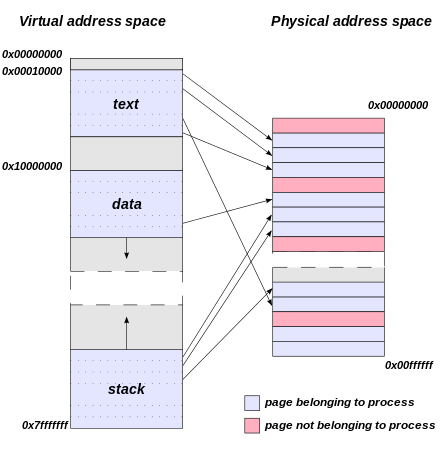Theories taken from Think-OS
[ Think-OS ] ( Thanks Ko Thet Khine for sharing this awesome book )
Virtual Memory
- most operating systems provide virtual memory, which means that programs never deal with physical addresses, and don't have to know how much physical memory is available.
- On a 32-bit system, virtual addresses are 32 bits, which means that the virtual address space runs from 0 to 0xFFFFFFFF. The size of this address space is 232 bytes, or 4 GiB.
Memory Segments
[ Higher Address ]
Kernel Space - User cannot access this area
------------------------------------------------------------------
stack segment -> stack frame = arg and local variables of function
|
| ( Grow down to lower )
------------------------------------------------------------------
^
^ ( Grow up to higher )
heap segment -> contains chunks of memory allocated at run time
------------------------------------------------------------------
global segment -> .bss = global variables and local variables that are declared static
static segment -> .data = Initialized global variables
code segment -> .text = Assembly Instructions
[ Lower Address ]
aspace.c
#include <stdio.h>
#include <stdlib.h>
int global;
int times_called()
{
static int counter = 0;
counter++;
printf ("Address of static variable %p\n", &counter);
return counter;
}
int main ()
{
int local = 5;
void *p = malloc(128);
char *s = "Hello, World";
printf ("Address of main is %p\n", main);
printf ("Address of global is %p\n", &global);
printf ("Address of local is %p\n", &local);
printf ("p points to %p\n", p);
printf ("s points to %p\n", s);
times_called();
}
Result
luna@luna-LOL:~/Desktop/pwn$ ./aspace
Address of main is 0x80484ca
Address of global is 0x804a02c
Address of local is 0xbff1d800
p points to 0x9ea5008
s points to 0x804862f
Address of static variable 0x804a028
Address Translation
Most processors provide a memory management unit (MMU) that sits between the CPU and main memory. The MMU performs fast translation between VAs and PAs
(CPU) --VA--> (MMU) --PA--> (MCU)
MMU splits
- page number -> look up in TLB ( page table cache in kernel )
- offset
Page Table = mapping of VA page no -> PA page no
[ Page Table Wiki ]
Memory Examining with GDB [ GNU Debugger ]
GDB Cheatsheets [ 1 ]
Compiling with GNU Debug Options ( We don't know assembly for now )
luna@luna-LOL:~/Desktop/pwn$ gcc -g -o aspace-d aspace.c
loading in gdb
gdb ./aspace-d
browsing source
(gdb) list
1 #include <stdio.h>
2 #include <stdlib.h>
3
4 int global;
5
6 int times_called()
7 {
8 static int counter = 0;
9 counter++;
10 printf ("Address of static variable %p\n", &counter);
(gdb) list 1,20
1 #include <stdio.h>
2 #include <stdlib.h>
3
4 int global;
5
6 int times_called()
7 {
8 static int counter = 0;
9 counter++;
10 printf ("Address of static variable %p\n", &counter);
11 return counter;
12 }
13
14 int main ()
15 {
16 int local = 5;
17 void *p = malloc(128);
18 char *s = "Hello, World";
19
20 printf ("Address of main is %p\n", main);
setting a breakpoint
(gdb) break main
Breakpoint 1 at 0x80484db: file aspace.c, line 15.
breakpoint info
(gdb) info b
Num Type Disp Enb Address What
1 breakpoint keep y 0x080484db in main at aspace.c:15
delete breakpoint
del 1
setting a breapoint with line number
(gdb) b 14
Breakpoint 2 at 0x80484db: file aspace.c, line 14.
run program and hit the breakpoint
(gdb) run
Starting program: /home/luna/Desktop/pwn/aspace-d
Breakpoint 2, main () at aspace.c:15
15 {
Registers Info ( currently skip )
(gdb) info registers
eax 0xb7fbcdbc -1208234564
ecx 0xbffff530 -1073744592
edx 0xbffff554 -1073744556
ebx 0x0 0
esp 0xbffff500 0xbffff500
ebp 0xbffff518 0xbffff518
esi 0xb7fbb000 -1208242176
edi 0xb7fbb000 -1208242176
eip 0x80484db 0x80484db <main+17>
eflags 0x286 [ PF SF IF ]
cs 0x73 115
ss 0x7b 123
ds 0x7b 123
es 0x7b 123
fs 0x0 0
gs 0x33 51
Run Next lnstruction
(gdb) ni
0x080484e1 15 {
Stack frame ( ebp,esp )
esp [Stack-Pointer] 0xbffff500
[ Local Variables store here ]
ebp [Stack-Base-Pointer] 0xbffff518
Run after assigning local variable and calculate stack size
(gdb) print 0xbffff518-0xbffff500
$1 = 24
(gdb) print/x 0xbffff518-0xbffff500
$2 = 0x18
Examining the stack ( main function )
(gdb) x/24x 0xbffff500
0xbffff500: 0x00000005 0xbffff5c4 0xbffff5cc 0xa7259f00
0xbffff510: 0xb7fbb3dc 0xbffff530 0x00000000 0xb7e21637
0xbffff520: 0xb7fbb000 0xb7fbb000 0x00000000 0xb7e21637
0xbffff530: 0x00000001 0xbffff5c4 0xbffff5cc 0x00000000
0xbffff540: 0x00000000 0x00000000 0xb7fbb000 0xb7fffc04
0xbffff550: 0xb7fff000 0x00000000 0xb7fbb000 0xb7fbb000
0x00000005 => local variable at the top of the stack
Run after malloc() and examine the Heap
# Know the Heap Address
(gdb) info proc mappings
process 5041
Mapped address spaces:
Start Addr End Addr Size Offset objfile
0x8048000 0x8049000 0x1000 0x0 /home/luna/Desktop/pwn/aspace-d
0x8049000 0x804a000 0x1000 0x0 /home/luna/Desktop/pwn/aspace-d
0x804a000 0x804b000 0x1000 0x1000 /home/luna/Desktop/pwn/aspace-d
0x804b000 0x806c000 0x21000 0x0 [heap]
0xb7e08000 0xb7e09000 0x1000 0x0
0xb7e09000 0xb7fb9000 0x1b0000 0x0 /lib/i386-linux-gnu/libc-2.23.so
0xb7fb9000 0xb7fbb000 0x2000 0x1af000 /lib/i386-linux-gnu/libc-2.23.so
0xb7fbb000 0xb7fbc000 0x1000 0x1b1000 /lib/i386-linux-gnu/libc-2.23.so
0xb7fbc000 0xb7fbf000 0x3000 0x0
0xb7fd5000 0xb7fd6000 0x1000 0x0
0xb7fd6000 0xb7fd9000 0x3000 0x0 [vvar]
0xb7fd9000 0xb7fdb000 0x2000 0x0 [vdso]
0xb7fdb000 0xb7ffe000 0x23000 0x0 /lib/i386-linux-gnu/ld-2.23.so
0xb7ffe000 0xb7fff000 0x1000 0x22000 /lib/i386-linux-gnu/ld-2.23.so
0xb7fff000 0xb8000000 0x1000 0x23000 /lib/i386-linux-gnu/ld-2.23.so
0xbffdf000 0xc0000000 0x21000 0x0 [stack]
++++++++++++++++++++++++++++++++++++++++++++++++++++++++++++++++++
# Heap
0x804b000 0x806c000 0x21000 0x0 [heap]
++++++++++++++++++++++++++++++++++++++++++++++++++++++++++++++++++
# Examine
(gdb) x/24x 0x804b000
0x804b000: 0x00000000 0x00000089 0x00000000 0x00000000
0x804b010: 0x00000000 0x00000000 0x00000000 0x00000000
0x804b020: 0x00000000 0x00000000 0x00000000 0x00000000
0x804b030: 0x00000000 0x00000000 0x00000000 0x00000000
0x804b040: 0x00000000 0x00000000 0x00000000 0x00000000
0x804b050: 0x00000000 0x00000000 0x00000000 0x00000000
Let's skip heap for now
Reference
- https://sourceware.org/gdb/wiki/
- I read Shell Coders Handbook, Hacking: The Art of Exploitation and so many blogposts for this ( at least 3 years ago and I don't remember all )
- Think-OS for Operation System Concepts
- Modern Operating System Book
